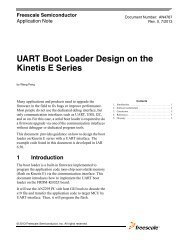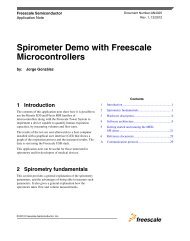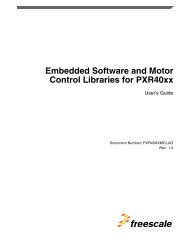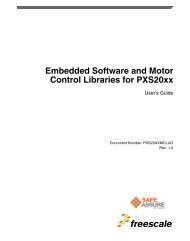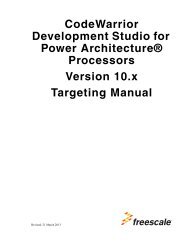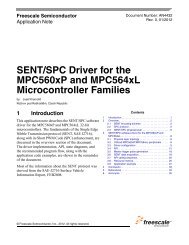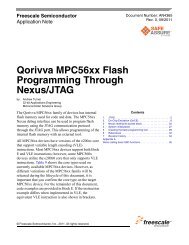Freescale MQX™ RTOS 3.6.2 Release Notes
Freescale MQX™ RTOS 3.6.2 Release Notes
Freescale MQX™ RTOS 3.6.2 Release Notes
You also want an ePaper? Increase the reach of your titles
YUMPU automatically turns print PDFs into web optimized ePapers that Google loves.
- The application runs tasks (e.g. shell) which open and access files provided by the MFS<br />
filesystem device.<br />
- When user unplugs the USB mass storage device, the application has only a limited way to<br />
detect an opened file exists before uninstalling the MFS filesystem device.<br />
- The file I/O functions begin to report errors when accessing the device after it is physically<br />
detached. The application code should be designed in a way that the tasks close all files<br />
affected by the detach event before the MFS filesystem driver can be uninstalled.<br />
- When MFS filesystem device is uninstalled while open files are still accessed from other<br />
tasks, an unhandled exception may occur.<br />
We recognize that this implementation may add additional application overhead. We are enhancing<br />
MQX I/O subsystem so the file operations will safely return error states even after the underlying<br />
device driver is uninstalled. This enhancement will simplify the application code error recovery.<br />
6.9 USB Memory Stick Compatibility Issues<br />
The MQX 3.6 brings several changes in MFS and USB implementation which broadens the support<br />
for various USB Memory devices. Despite of this effort, some of the USB devices are known to have<br />
compatibility issues - especially when accessed from EHCI-based Host Stack (e.g. MCF52277 and<br />
MCF54455).<br />
Fixing this issue remains a priority for the future MQX versions.<br />
6.10 Spurious Interrupts on ColdFire Platforms<br />
MQX users reported accidental occurrence of spurious interrupts. Spurious interrupt occurs when<br />
interrupt source is being disabled by software while the interrupt flag is being set by hardware. As a<br />
consequence, interrupt controller looses the information about what was the source of the interrupt.<br />
ColdFire processor documentation reccomends to temporarily disable all interrupts each time any<br />
interrupt source is being masked in interrupt controller or in peripheral module register.<br />
User application or custom user drivers need to follow this procedure to avoid spurious interrupts to<br />
occur. The interrupt-driven I2C I/O driver was updated accordingly in MQX 3.6. Updating other I/O<br />
drivers remains a task for future MQX versions.<br />
6.11 CodeWarrior version 10<br />
The MQX 3.6 newly includes support for CodeWarrior Development Studio version 10. Several<br />
issues were observed during MQX porting and will be addressed in follow-up releases of both MQX<br />
and CodeWarrior tools:<br />
CodeWarrior 10 Flash programming process is not trivial. See all required steps in the MQX<br />
Getting Started document.<br />
Problems were observed when trying to debug and place breakpoints in the MQX library<br />
code.<br />
OSBDM / OSJTAG debugger looses connection with target when CPU executes the “stop”<br />
instruction. This happens in MQX when all tasks are blocked waiting for event occurrence or<br />
time interval to elapse. When kernel dispatcher does not find any task to be set active, it<br />
executes the “stop” instruction and suspends the CPU until next interrupt. With OSBDMconnected<br />
boards, avoid this situation by enabling the idle task. Set MQX_USE_IDLE_TASK<br />
to 1 in the user_config.h file.<br />
When several MQX projects are loaded in the CodeWarrior 10 workspace, unfolding the<br />
project tree items may become slow. To improve manipulation with source tree in the project<br />
<strong>Freescale</strong> MQX <strong>Release</strong> <strong>Notes</strong><br />
24 <strong>Freescale</strong> Semiconductor



